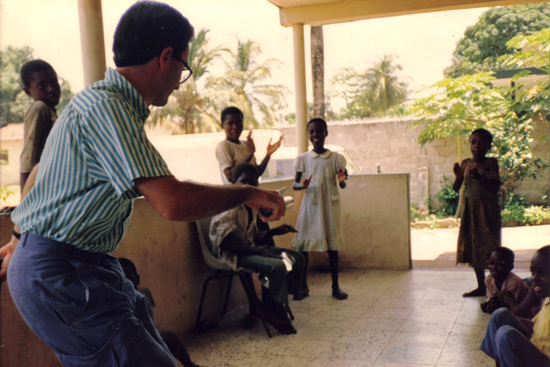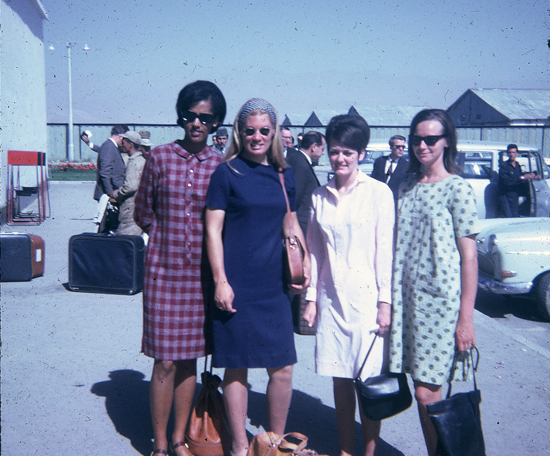BU, Peace Corps Celebrate 50-Year Partnership
Memories, dreams, music highlight anniversary event
Click on the names below to watch videos of returned Peace Corps volunteers sharing their experiences, among them teaching HIV/AIDS prevention, exploring Google with villagers, and even being held captive in a Ugandan airport.
The BU community is helping a longtime partner celebrate a historic anniversary. The Peace Corps is 50 years old, and over a remarkable half-century BU graduates and students have served in host countries as diverse as Mauritania and Honduras, Kazakhstan and Zambia. Most say the experience changed their lives forever.
To commemorate the milestone, the public is invited to attend Peace Corps at 50: Fond Memories and Future Dreams, on Friday, April 15, from 4 to 7 p.m. at the BU Trustee Center. The multimedia event, which will also kick off BU’s second annual Alumni Global Day of Service on April 16, features Jonathon Simon, director of the BU Center for Global Health and Development, a keynote address by Peace Corps chief of staff William Stacy Rhodes, and a panel discussion by alumni returnees who served in Cape Verde, Côte d’Ivoire, and Ecuador. There will also be a world music performance, a College of Fine Arts exhibition of Peace Corps–inspired art, and an exhibition of winning photos from a 2011 Boston area Peace Corps volunteers competition.
The Peace Corps was established on March 1, 1961, by President John F. Kennedy, who outlined three goals: to help people of interested countries meet their need for trained men and women, to promote a better understanding of Americans in the nations where they serve, and to promote a better understanding of other peoples and cultures on the part of Americans. “One thing I think we forget today is how isolated the United States was in 1961,” says Beverly Brown, director of development for the Center for Global Health and Development, a coordinator of the anniversary event. “We didn’t think favorably of the world at that time, and so the call of JFK was to think beyond our national boundaries and really engage the world and improve our place in the world.” The spirit of Kennedy’s unique call to action “is something we really want to celebrate,” she says, in the hope that it will “engender in young people the desire to get involved.”
Among the scores of alumni whose lives were transformed by the experience is Joseph Anzalone (SPH’92), senior manager of the School of Public Health’s international health department, which offers graduate credit for Peace Corps service. Serving in Liberia from 1987 to 1990, Anzalone faced many challenges and obstacles, not least a civil war. He worked in an upcountry missionary hospital helping to administer a revolving drug fund to meet the needs of a drastically underserved community. His former boss there is now the Liberian minister of public health. Anzalone’s Peace Corps service had as much of an impact on his personal life as it did on his career: while in Liberia, he met and befriended Paola Ranieri, a Liberian-Italian, to whom he has been married for 20 years.
“Today there are a number of ways to go overseas to have an international experience,” says Anzalone (above, in Liberia, circa 1987). Before his Peace Corps service, the closest he came to visiting a developing country was a trip to Sicily. “One of the things you get in Peace Corps that’s difficult to get elsewhere is living at the level of the people.” Unlike NGO subcontractors or diplomatic or other U.S. government employees, who mostly live in compounds removed from village life, Peace Corps volunteers “live next to people and absorb their culture,” he says. “You start to see things through that cultural lens, and it really changes your perspective on how you evaluate and think about things.”
Headed by Aaron S. Williams, who served in the Dominican Republic from 1967 to 1970, the Peace Corps operates in 77 countries (a total of 139 nations have hosted volunteers during its history), most in Africa and Latin America. About 200,000 volunteers have completed one or more 27-month stints, and although volunteers’ average age is 28, 7 percent of those enrolled are over 50 and the oldest is 86. Of the 8,655 volunteers now serving, 90 percent have bachelor’s degrees. BU ranks 17th in the number of such alumni who have volunteered; 63 alumni are currently deployed in countries such as Armenia, China, Macedonia, Tonga, Sierra Leone, and Swaziland.
Peace Corps volunteers are “grassroots innovators,” says Peace Corps deputy director Carrie Hessler-Radelet, and the organization grooms them to be “creative problem solvers.” After their years overseas, they “return to the United States as global citizens, with leadership, cross-cultural understanding, language, and technical skills that position them well for professional opportunities,” Hessler-Radelet says.
Bronwen Parry Pritchard (SAR’67) was one of the first BU graduates to sign up for the Peace Corps when recruiters showed up on campus in 1966. She served with a smallpox vaccination team in Afghanistan, in Jalalabad and Ghazni. She applied as a junior, during turbulent times. An unpopular war raged in Vietnam, and her brother was serving in the army there. Pritchard says she wanted to make a difference and be a different person, someone whose world included more than marriage and children. “The language training, at the Experiment in International Living in Putney, Vermont, was very tough; only 20 of 60 graduated,” she recalls. She arrived in Afghanistan in summer, spellbound by the vast rugged landscape that was “flat and mountainous at the same time.”
All these years later, Pritchard (above, second from left, in 1967) still prizes the embossed leather bag, pointy hand-hewn slippers, and hammered silver earrings she bought during her stint in Afghanistan, and she stays in touch with her fellow volunteers, women who descended onto the Kabul airport tarmac in skirts and heels. “In the village we wore pajama pants, tops that covered our elbows, and scarves on our heads,” she says. Her service was cut short after she contracted dysentery, and she recalls crying her eyes out when the doctors treating her at a New York hospital told her she was too frail to return to Afghanistan. “I’d been in the hospital for a month, and when they said they wouldn’t send me back to Afghanistan I was crushed. My friends sent my things home in a trunk. I still have that trunk.”
For Anzalone, his goal in joining Peace Corps wasn’t lofty. “It was something to do for two years,” he says matter-of-factly. “But in a way it shaped my life, since it was my entry into public health.” In his job at SPH, Anzalone sees students in the master’s in international health program return from their Peace Corps service invigorated and excited about their careers. One of the many differences between his time and now, though, is that today’s volunteers are far less isolated. “When I was a volunteer it took three weeks to three months to get mail,” says Anzalone. “Now, everyone blogs.”
The transition back to American culture has been typically jarring for returning volunteers, who grow accustomed to daily life in far-flung villages, many lacking electricity and plumbing. Pritchard’s homecoming was horrible, she says. “You were overwhelmed by the richness of this country and the choices you had; you wanted to help people and were being asked what color checkbook you’d like.” She still is thrilled encountering Afghans today and speaking what she remembers of the language. The group of volunteers she served with—they call themselves “the girls”—get together every three to five years, and as a group they sponsored an Afghan immigrant for citizenship. “The experience was life-changing for all of us,” Pritchard says. But hers is perhaps the deepest connection. Her only child, a son who graduated from Parsons School of Art and Design with a degree in sculpture and makes jewelry, told Pritchard in the wake of the 9/11 attacks, “Mom, I have to do something.” He enlisted in the Army, became a ranger, and was deployed to Afghanistan. Now out of the army, he plans to return there. “He feels the same pull as I did.”
“The Peace Corps taught me to never quit,” says Pritchard. “If you have the desire to do something, go after it.” She feels that because of her Peace Corps experience, nothing in her life has been too difficult to handle. These days she visits schools, her Afghan souvenirs in tow, and talks about her Peace Corps days with young children, in the hope that they might follow her path.
BU’s Peace Corps anniversary event is on Friday, April 15, from 4 to 7 p.m. at the BU Trustee Center, One Silber Way, ninth floor. More information about the event and the Global Day of Service is available here. Because of space constraints, advance registration for the free anniversary event is required; register here.
Susan Seligson can be reached at sueselig@bu.edu. Robin Berghaus can be reached at berghaus@bu.edu.
Have a Peace Corps story? Share it in the comments below.


Comments & Discussion
Boston University moderates comments to facilitate an informed, substantive, civil conversation. Abusive, profane, self-promotional, misleading, incoherent or off-topic comments will be rejected. Moderators are staffed during regular business hours (EST) and can only accept comments written in English. Statistics or facts must include a citation or a link to the citation.